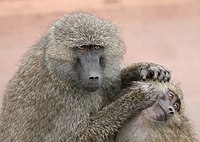Altruism (biology)

Altruism means doing something that helps someone else, even if it doesn't help you. It's like sharing your toy with a friend even if you really want to play with it too. In biology, altruism means the same thing but with other animals. For example, a bird might share its food with another bird even though it's hungry too.
This might seem strange, since we usually think of animals as only caring about their own survival. But sometimes animals do things that help others at their own expense. This is called altruism.
One reason why animals might act altruistically is if they are related to the other animal. This is called kin selection. If you share your food with your sister, your genes will still be passed on to her children, and so your genes will continue to survive in future generations.
Another reason why animals might act altruistically is if they live in a group where everyone works together. For example, meerkats live in groups and take turns watching out for danger. Even if a meerkat isn't on watch, it will still give an alarm call if it sees a predator, which puts it at risk of being attacked. But by doing so, it helps protect the rest of the group.
So even though altruism might seem like a strange thing for animals to do, it can actually help them survive and pass on their genes to future generations.
This might seem strange, since we usually think of animals as only caring about their own survival. But sometimes animals do things that help others at their own expense. This is called altruism.
One reason why animals might act altruistically is if they are related to the other animal. This is called kin selection. If you share your food with your sister, your genes will still be passed on to her children, and so your genes will continue to survive in future generations.
Another reason why animals might act altruistically is if they live in a group where everyone works together. For example, meerkats live in groups and take turns watching out for danger. Even if a meerkat isn't on watch, it will still give an alarm call if it sees a predator, which puts it at risk of being attacked. But by doing so, it helps protect the rest of the group.
So even though altruism might seem like a strange thing for animals to do, it can actually help them survive and pass on their genes to future generations.
Related topics others have asked about:
